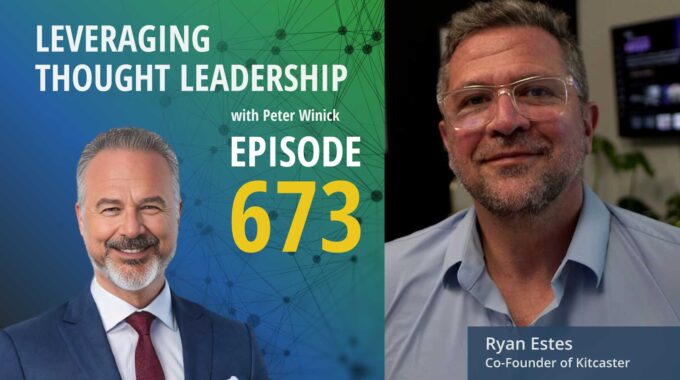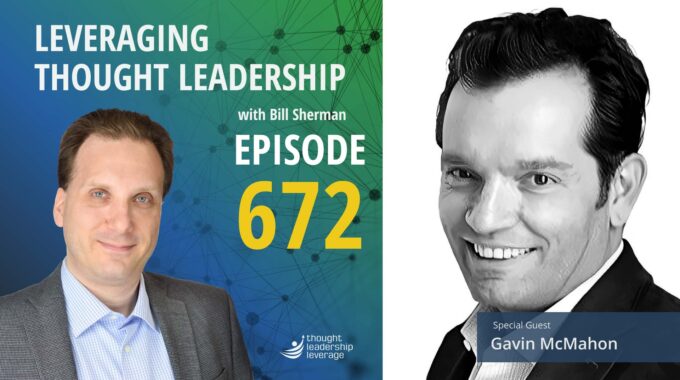Building Brand Love Through Storytelling This episode explores how storytelling can drive inclusion, purpose, and…
The Role of Emotional Intelligence in Leadership | Rob Volpe
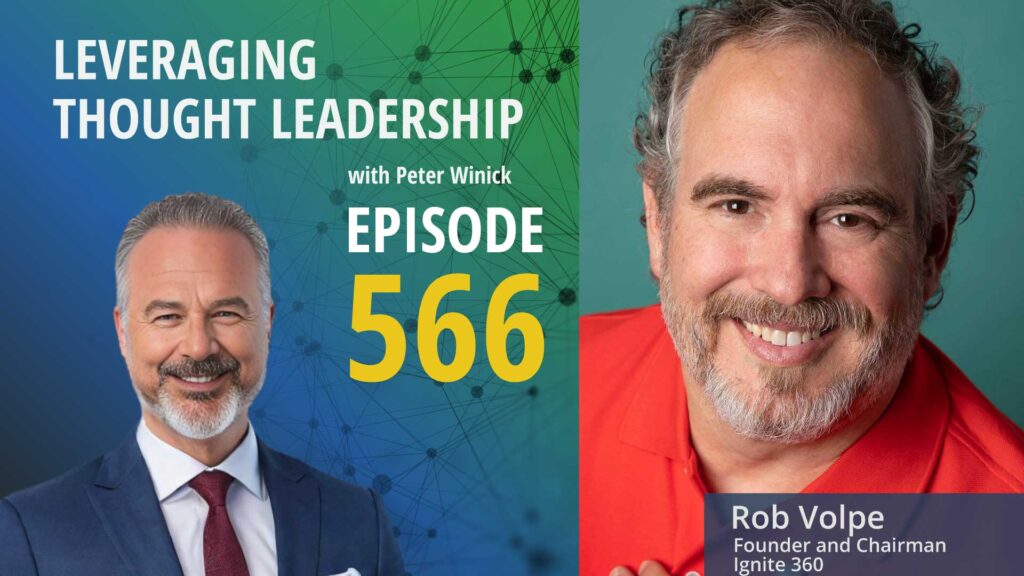
Transforming Teams with Compassion and Understanding
A conversation with Rob Volpe about the impact empathy can have for leaders, teams, and organizations.
In this episode of “Leveraging Thought Leadership” with host Peter Winick, the guest is Rob Volpe, a keynote speaker, award-winning author, and trainer who focuses on promoting empathy in the workplace. Volpe is the author of “Tell Me More About That: Solving the Empathy Crisis One Conversation at a Time,” and founder and chairman of Ignite 360, a marketing and research firm that emphasizes empathy.
Volpe discusses his journey to become a thought leader, starting from a background in Hollywood where he became interested in marketing and understanding human behavior. His journey eventually led him to realize that empathy was the key to his success. Through storytelling, he shares how empathy can be used to understand others and build better relationships, which also contributes to improving business outcomes.
He recounts his experience growing up in a small town in Indiana, where he used empathy as a survival skill to navigate bullying. This led him to understand others’ perspectives, even when he didn’t agree with them, and helped him develop a communication style that fostered positive relationships.
Volpe addresses the question of whether empathy is innate or developed. He likens it to a muscle that needs constant exercise to grow stronger, emphasizing that leaders should promote empathetic cultures. However, he notes that many CEOs struggle with empathy, as they fear losing respect if they show vulnerability in the workplace.
Despite these challenges, Volpe believes that a culture of empathy can improve business metrics. Studies are emerging that support this idea, demonstrating that empathetic organizations perform better over time. The challenge, however, lies in changing long-held beliefs about workplace dynamics and encouraging a shift toward embracing emotional intelligence (EQ).
Finally, Volpe discusses the services he offers through Ignite 360 and his keynotes. His audience includes professional workplaces where empathy can improve customer service, finance, and other functions that require a higher degree of emotional intelligence. He provides training and presentations that help organizations understand and apply empathy to create better work environments.
Three Key Takeaways:
- Empathy as a Core Skill: Volpe emphasizes the importance of empathy in both personal and professional contexts. He shares how empathy can be developed like a muscle through consistent practice and active engagement. This skill not only improves workplace dynamics but also enhances customer relationships and overall business performance.
- The Role of Empathy in Leadership: Many CEOs recognize the need for empathy in fostering a positive workplace culture, yet many struggle with vulnerability and fear of losing respect. Volpe underscores the importance of empathetic leadership in setting the tone for an organization, encouraging a shift toward embracing emotional intelligence (EQ) despite long-held corporate beliefs.
- Empathy’s Impact on Business Success: Volpe discusses studies that demonstrate a correlation between empathetic organizations and better business outcomes. He points out that while industries like tech and healthcare may not traditionally prioritize empathy, they can benefit from embracing it to improve customer experiences and employee satisfaction. His work at Ignite 360 aims to help organizations build empathetic cultures to drive better performance over time.
Volpe’s business is empathy, but it can be hard to create offerings around soft skills. If you have big ideas around EQ but are struggling to bring that content to your audience in a meaningful way, Peter Winick and the Thought Leadership Leverage team can help you!
Transcript
Peter Winick And welcome, welcome, welcome. This is Peter Winick. I’m the founder and CEO at Thought Leadership Leverage. And you’re joining us on the podcast today, which is Leveraging Thought Leadership. Today, my guest is Rob Volpe, and Rob is an interesting chap. He you know, if you look at and I just moved it over here, his website, he’s an empathy activist, which is an interesting way to describe oneself in terms of teaching and coaching people, how to develop empathy. But he’s also an author. He’s also a business owner. He’s been in and out of his own business. So we’re going to have a lot of interesting conversations here today. So welcome today, Rob, how are you?
Rob Volpe Good. Peter, thanks so much for having me. I’m looking forward to the conversation.
Peter Winick Yeah. So I would say like the short end would be you’re in the business of empathy, right?
Rob Volpe Yes, I am in the business of empathy. The company I started Ignite 360. We’re a marketing research firm. That’s all about empathy, understanding how people think and feel and then helping our clients figure out what to do with that, how to make that connection themselves and then build hopefully better products, services and communications. 
Peter Winick So tell me a little bit about your journey, because most people don’t dream at seven years old to, you know, wake up and one day I want to be a thought leader and empathy activist or whatever. Maybe you did. I didn’t, you know, I’m sure it’s probably a non-direct, non-linear path to where you got here now. But it was it’s interesting. So maybe share some ways.
Rob Volpe It’s always. And the best journeys are that where you stop and smell the roses the different places. I mean gosh way back when I wanted to be an airline pilot, that morphed into being a journalist, which then morphed into, oh, I want to work in Hollywood. And then really realized while I was working in Hollywood way back 30 years ago, that I was really fascinated with marketing. I was and had always been, even growing up like it was. It was about understanding human behavior and the human truth. And I think that’s where the journalism piece kind of came in, but didn’t answer that. The universe kept putting signs in front of me and steering me in that direction. I finally, in 2006, 2007, kind of got the message and started to get into this research space again, not understanding that empathy was all part of that. An empathy has always been first. We’re all born with the ability to have empathy.
Peter Winick But stay there for a minute, because what you put out there sounded like asking a classroom of first graders, what do you want to be when you grow up? Oh, I want to be a pilot who? I want to be a marketer, whatever. And to you, it’s clearly obvious that obviously empathy was the thread that pulled through it all to some of us. Like, I don’t know, the rest of us. Tell me more, right? How did you see that thread? Because that’s kind of a cool way that you connected the dots there.
Rob Volpe Yeah. I mean, as I got into the research space and looking back at like, well, what are the things that I love about consulting and working with all these clients and getting to know people? It is about that empathetic connection and helping other people understand people so that they can, you know, make the world a better place, whether it’s their the world is their business or it is the world at large. And as I look back to, well, yeah, you do that, how do you build empathy? You do that through storytelling. Well, that’s what journalism is. It’s finding the truth and turning it into a story that is compelling. And for myself, those who are up and growing up in small town Indiana and getting bullied and teased, as I write about in my book, that helped develop my empathy superpower because it became a survival skill for me as well. I learned how to use empathy in order to survive through, you know, understanding.
Peter Winick My class at that, because it sounds like it would be. It sounds like as the victim of being bullied, you’re now being practicing empathy to the one bullying you. Like that sounds like a yeah.
Rob Volpe And it’s not it. It is. And it’s about resilience and how you choose to sort of survive. I couldn’t leave my school. We were stuck in this small town. So I hadn’t I couldn’t change that situation. So what I could do, and it wasn’t it just because you might understand where somebody is coming from, it doesn’t mean that you have to agree with them. So. And it wasn’t as much about understanding like, well, what is it about me that they’re picking on or something? It was starting to understand who they were and using empathy and my communication with them to get them to open up and share and tell their stories so that they would suddenly like me a little bit more, so that maybe when, you know, and typically in those situations and in my case, there were a few protagonists and then there was everybody else. Well, if you can, if you can influence everybody else so that they like you, then when the protagonists come in, the protagonists are going to look like assholes, but be the rumors, whatever it is, like they’re not. Everybody else isn’t going to jump into the fray.
Peter Winick They’re realizing it.
Rob Volpe Exactly. Exactly. And so that means.
Peter Winick Better than, you know, the other option, I guess the Stockholm syndrome or something. So that’s, that’s a better option.
Rob Volpe Yeah. So that how I used empathy back then as this sort of survival skill. And things got better over the years. And I ended up senior class speaker. I was the editor of the yearbook. I like there were a lot of different things that I was able to achieve. And so, yeah, empathy was really critical to that. And again, it’s just always been part of who I am. It’s part of who everybody is. But it’s whether you the choice to actually engage from a more empathetic perspective.
Peter Winick But when you say it’s part of who everyone is, it’s interesting in that, you know, we’re living in a in the age of the soft skills, I think. Right. So, so the technical or the technical and not to diminish any of those, etc.. But there’s still this there’s a debate that goes on that might say, number one, Rob is empathetic, Rob is charismatic, Rob is intuitive, whatever. And then there’s and that may be true. Maybe you were born a certain way and you’re more likely to be some of those characteristics that than I. But then there’s another school of thought, which is, I think the one that you come out of that says, well, empathy is a thing that we all have. If you’d like to develop that as a capability, there are ways that you can do that. Right. And there’s probably a self-selection piece that, you know, probably those that need it the most would be the least likely to say, yes, I’m an obnoxious jerk. I’d like to now be more empathetic. But what do you think in terms of this, the innate piece versus the ability to develop it as a capability?
Rob Volpe So the, the analogy I use when I’m giving keynotes and talking with people is that it’s empathy is like a muscle. So when a baby’s born, it’s got all the muscles in its legs to walk, run, do all the things, but it can’t. The muscles aren’t strong enough. So the parents are creating situations.
Peter Winick Like the heads are really, really big heads that they.
Rob Volpe Have really huge heads and those don’t get any smaller. And there’s something about like, your ears are the only thing that keep growing your ears and, you know, as you continue to get older, but a baby, you know, a baby has to strengthen the muscles up and be given those opportunities to, you know, scoot, then crawl, then stand, scoot. Long walk, run. Right. And then hell breaks loose for the parents and life changes. Empathy is the same way. It’s this skill that we are born with. It resides in all of us. The only people that the scientists have found are not empathetic are those that are on the antisocial disorder spectrum. So you’re narcissist from the garden snake variety to narcissistic personality disorder to sociopaths and psychopaths. That empathy switch is turned off for them. But the rest of us, and that’s about 10% of the population, 90% of the population has empathy, has the ability to see the point of view of somebody else, or to see when somebody feel what somebody else is feeling. It’s a choice as to whether you listen to it. And you have to make the choice to engage in and strengthen the muscle up. And then the other piece, and this is where people get tripped up because, some studies have found, like CEOs recognize that it’s their job to help set an empathetic culture, use those soft skills and demonstrate them. But two thirds of CEOs recognize that in different size companies, they’re three quarters of CEOs admit that they have difficulty with their own ability to be empathetic. And that same number also indicates that they are concerned they’re going to lose respect if they demonstrate empathy in the workplace.
Peter Winick So they need to be seen as the. Tough guy, decisive blah blah blah blah blah. Exactly. But vulnerability used to be perceived as a weakness, being vulnerable in the workplace. And I think we’re I don’t know if we’re there yet, but I think more and more and more, it’s actually a characteristic more people admire and sees a strength like, hey, Rob, for you to be vulnerable with me, that takes courage, that takes guts. We just talked about you being bullied as a kid, right? That’s a vulnerable place I might have accidentally put you in. Well, you brought it up, so I’m good.
Rob Volpe I write about it in my book. So it is out there. Yeah, but yes, you. But yeah, it is, it can be viewed as vulnerability to share that.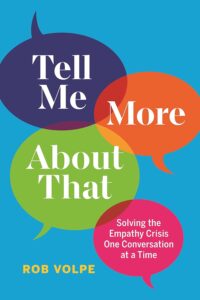
Peter Winick If you’re enjoying this episode of Leveraging Thought Leadership, please make sure to subscribe. If you’d like to help spread the word about our podcast, please leave a five-star review at rate this podcast.com/l t l and share it with your friends. We’re available on Apple Podcast and on all major listening apps as well as at Thought Leadership Leverage.com/podcast.
Rob Volpe The age that we’re living in is about authenticity, and we’ve been heading in this direction for 20 or 30 years now. It is about authenticity and being genuine. I think, you know, there’s nuance in everything. And the unfortunate thing about the world that we live in right now is there isn’t as much room for nuance because people are, digesting things in soundbites and, and tweets and little, you know, 140 character bits you can’t get into the nuance of because the nuance around that is you have to choose how you’re being vulnerable, where you’re showing up and choosing what to do with that when somebody is being honorable with you. And again, you know, the thing that I tell people as well, empathy is one data point in your decisions. Like if you just make your decisions based on empathy, that’s not healthy. Just like if you make your decisions based solely on the data and you’re that hard charging guy that we were just.
Peter Winick Talking input, it’s a variable or an input or a factor or something. Exactly. I want to go back to something that you touched on a couple moments ago, and it was about the culture, right? So when I think about various threads of thought leadership, I think of the application at the individual level. Could not benefit from developing better empathy skills. Sure, we all could, right? Even if I’m on that top tier, which I’m not saying I am. Right. Like, yes. Then the next thing would be how cool would it be to work on it? Team practices, empathy and the ultimate, you know, the promised land as well. Organization. The entire entity that I work in, where it is part of the culture. So be done in in those regards, because that seems to me, you know, if you can connect a culture of empathy to a higher performance growth, you know, you know, pick a business metric that would be nirvana.
Rob Volpe Yeah, absolutely. And there is some data that’s starting to come out showing that the more empathetic organizations are the ones with a better developed EQ, are performing better over time. Yeah. The other issue, societally, you know, we like to put the bad guy up on the pedestal. So if you look at the titans of tech, they’re not the most empathetic. Most of them, although such a Nadella is and he writes and talks and promotes a culture of empathy within Microsoft. And Microsoft is kind of sitting atop that whole heap. But to move your organization, it really especially to embrace the EQ skills because you are going against, you know, a hundred years of programing of what work is supposed to look like the way men are supposed to show up in the workplace, the way women are supposed to show up in the workplace.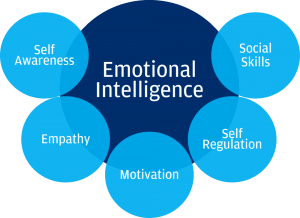
Peter Winick Well, and not to paint with too broad of a brush. But when you look at. Tech that engineering culture, the technology, culture. A little bit of the bro culture. It’s not necessarily where empathy tends to show up as much versus in a, I don’t know, the medical world, right. Or a creative, you know, there’s certain places we do that. Yeah. I would assume that my oncologist has a little bit more empathy than my plumber. You know.
Rob Volpe You would hope. However, the main medical profession doctors get about in all that medical school that they go through, they get about a half a day, an afternoon on bedside manner.
Peter Winick So that I’ve met a few that were off that day, I think.
Rob Volpe Oh, easily. Easily. I’ve heard horror stories from people about how their medical professional was not empathetic with them. I think when you look at the nurses and some of the people that are also frontline, there can be a lot more empathy in the nursing profession.
Peter Winick Yeah.
Rob Volpe But doctors themselves, you know, need, need a little guidance to make things a little better. And the way that they’re delivering their news and seeing the perspective of other people and, you know, not and dismantling their judgment, their biases.
Peter Winick Yeah. So I, I want to I want to go on a little bit of a different direction for a couple moments. Talk to me about your work and your business. Right. So you’ve had this thread of empathy. You’ve developed, you’ve written books, keynotes, etc. what are the ways? Well, the shorthand would be, you know, sort of who’s paying you to do what. What does that look like? What do you know if it’s how does an empathy activist spend his place?
Rob Volpe Well, this empathy activist is spending his days as the third CEO of a marketing research firm. But on that. So that side of the business that’s working with a lot of large multinationals and helping them solve their strategic issues on the empathy activist side, the engagements that people work with and come to me are on two different levels. One is the professional workplace situation. So, I get brought in to help do a presentation or a training to a team. It’s often a function where people are like, hey, I need more empathy. I’m working with. I’ll be giving a presentation in a couple of weeks to a well-known streaming service and their data tech team that handles all that when somebody loses their device, and there’s a data breach because, you know, somebody left their phone on a plane or in a bar, they are the customer service team that comes in and helps fix the data breach and lock everything down and do what needs to be done. As you can imagine, if you’ve ever lost a device, there’s a lot of emotion to it, and there’s opportunity for them to be more empathetic in the way that they’re engaging with their customers, the people that they’re supporting within the organization. So they’re bringing me in to talk about the principles of empathy and also how, they can be more empathetic. So I get a lot of engagements that are in that type of space where it’s different. Teams can be a marketing team, it can be a finance team. I’ve been brought in for, off sites. Have you ever.
Peter Winick Come in to be sort of the. Because that sounds like a bit proactive, rational, logical. Do you ever get brought in for sort of like an empathy emergency triage intervention?
Rob Volpe Not in that moment, but typically there has been empathetic failure that has led to them realizing, hey, we need to, to bring somebody in to help us better understand that.
Peter Winick Yeah. Because I find that, you know, when you think about it, when do people buy the burglar alarm? It’s not the week before they were robbed. It’s the days. Right. So we there might be a level of awareness and say this would be a good thing for us to do, but in all the priorities of resources and whenever we didn’t get around to. And then, oh, there was that oh shoot moment and it’s like, now we really like, we’re losing talent or we just lost a client or somebody stepped in it big time. And we really need to address the issue.
Rob Volpe Totally. Totally.
Peter Winick Yeah. Cool. As we start to wrap up, you’ve been at this quite some time, right? What would you say to the you of 15, 20 years ago? And it doesn’t have to be the U of empathy, but somebody that’s really passionate about a thing, it’s not necessarily their day job, but it constantly is part of who they are and what they what they do, and they know there’s a place for it. What might you recommend or suggest to them?
Rob Volpe I think a I applaud them for recognizing that and taking the steps to move toward it. I think it really is understanding and appreciating that this is a lot of work, and you have to. It’s like pounding the pavement to set your path, whether you’re going to just go viral on social media somehow, magically, and that’s going to make you the influencer, you’re going to write a book, you’re going to start a speaking business, you have to start and you’ve got to spend time on it, and it’s outside of your normal business hours. So make the commitment and keep going. That’s kind of the big thing.
Peter Winick And keep going. That’s important. Cool. Well, this has been fantastic. I, appreciate your time, and I love the work that you’re doing. Thanks. Thanks so much, Rob.
Rob Volpe Awesome. Thank you. Peter.
Peter Winick To learn more about Thought Leadership Leverage, please visit our website at ThoughtLeadershipLeverage.com to reach me directly. Feel free to email me at Peter at ThoughtLeadershipLeverage.com, and please subscribe to Leveraging Thought Leadership on iTunes or your favorite podcast app to get your weekly episode automatically.




